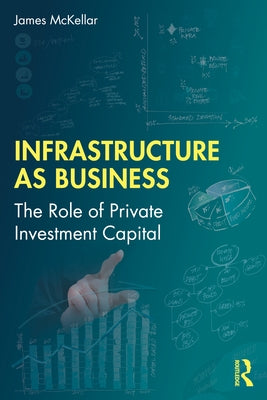Description
Infrastructure as Business brings new emphasis and clarity to the importance of private investment capital in large-scale infrastructure projects, introducing investors, policymakers, and other stakeholders to a key element that is surprisingly absent from the discourse on public-private partnerships. Despite the importance of modernizing infrastructure across the globe, governments often face challenges in securing the necessary capital to meet future need, as well as developing policy to meet these goals. Explaining the structure of the private investment universe and flow of private capital in such projects, this book ambitiously aims to bridge this "infrastructure gap" by elucidating shared terminology, conceptual frameworks, and an alignment of goals and objectives between public and private sectors--essential to meet increasing environmental, social, and governmental requirements for infrastructure in coming years.
- Appropriate for graduate-level courses in real estate, public policy, and urban planning that focus on infrastructure, project finance, and procurement and delivery models such as PPPs.
- Provides a clear understanding of private investment and PPPs to the investment community as well as professionals in real estate, project finance, and related fields, who often learn mostly on-the-job and from colleagues.
- Equips government officials and policymakers with key terms and concepts needed to "sit across the table" with private financers and explore opportunities for private capital investment in early project stages.
- Outlines communication strategies for both public and private sectors, which will increasingly need to collaborate to address climate change, respond to new technologies, and develop efficient ways to deliver services.
Written to engage academic, private investment, and public policy/governance audiences alike, Infrastructure as Business: The Role of Private Investment Capital invites discussion and opens doors to advancing new business models, with international applications, to offer increased value for private investors as well as more efficient, flexible funding for innovative infrastructure development in the future.
Author: James McKellar
Publisher: Routledge
Published: 09/05/2023
Pages: 264
Binding Type: Paperback
Weight: 0.88lbs
Size: 9.21h x 6.14w x 0.60d
ISBN13: 9781032493176
ISBN10: 1032493178
BISAC Categories:
- Business & Economics | Corporate Finance | Private Equity
- Business & Economics | Industries | Construction
- Business & Economics | Development | Sustainable Development
About the Author
Professor James McKellar, Brookfield Centre in Real Estate and Infrastructure, Schulich School of Business, York University, was Associate Dean, External Relations and former Director of the Brookfield Centre. Prior to joining York University, he was a faculty member at the Massachusetts Institute of Technology (MIT) and served as the first Director of the Center for Real Estate at MIT. In addition to MIT, he held faculty appointments at the University of Pennsylvania and the University of Calgary. Professor McKellar has a life‐long involvement in the real estate industry and has consulted to businesses and governments in many parts of the world on real estate matters covering housing, development, finance and investment, asset management, and market performance. His recent work focuses on infrastructure in the context of private investment, rapid urbanization, population growth, and sustainable infrastructure, particularly in emerging economies where new technologies, new business models and socio-cultural factors play a significant role. He is actively involved in the Sustainable Infrastructure Fellowship Program announced in June 2018 to coincide with the G7 held it Quebec City, Canada. has been involved in strategic issues related to real estate and infrastructure in both the private and public sectors, As principal of McKellar Associates Ltd., he specialized in strategic issues related to real estate and infrastructure.
This title is not returnable

